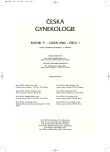Informed Consent in Gynecology and Obstetrics
Informovaný souhlas v gynekologii a porodnictví
Cíl:
Systematický přehled dostupné recentní literatury na téma informovaný souhlas, zhodnocení východisek a vytvoření teoretického základu pro realizaci procesu informovaného souhlasu v klinické praxi s důrazem na specifika oboru gynekologie a porodnictví.
Typ studie:
Literární přehled.
Název a sídlo pracoviště:
Ústav pro péči o matku a dítě, Praha; Katedra gynekologie a porodnictví IPVZ Praha.
Metodika:
Rešerše publikací na dané téma a implementace obecných principů lékařské etiky v oboru gynekologie a porodnictví.
Výsledky:
Obor gynekologie a porodnictví s sebou přináší množství kontroverzních klinických situací, které vyplývají ze specifika oboru. Informovaný souhlas je nedílnou součástí diagnosticko-terapeutického procesu a podmínkou postupu lege artis. Adekvátní souhlas s léčbou je informovaný, svobodný a kompetentní. Je prevencí etické krize v podmínkách etického konfliktu. Práce definuje obsah a strukturu informovaného souhlasu a upozorňuje na jeho technické náležitosti tak, aby byla naplněna jeho pravdivost a právní platnost.
Závěr:
Informovaný souhlas je významnou součástí komunikace mezi lékařem a pacientem. Lékař předává komplexní, kvalifikovanou, pravdivou a úplnou informaci. Kompetentní pacient tuto informaci přijme a na základě jejího porozumění se rozhodne, zda a v jaké podobě podstoupí navržený postup, či jej odmítne.
Klíčová slova:
informovaný souhlas, etický konflikt, etická krize, etické principy, autonomie, nonmaleficence, beneficence
Authors:
P. Křepelka
Authors‘ workplace:
Katedra gynekologie a porodnictví IPVZ Praha, vedoucí doc. MUDr. J. Feyereisl, CSc.
; Ústav pro péči o matku a dítě Praha, ředitel doc. MUDr. J. Feyereisl, CSc.
Published in:
Ceska Gynekol 2006; 71(1): 74-78
Category:
Original Article
Overview
Objective:
A systematic review of recent available literature on the topic of informed consent, evaluation of the terminus a quo and the creation of theoretical basis for execution of the process of informed consent in clinical practice with attention to specific aspects in gynecology and obstetrics.
Type of study:
Review of literature.
Setting:
Mother and Child Care Institute Prague, Chair of Gynecology and Obstetrics, IPVZ, Prague.
Methods:
Review of publications on the given topic and implementation of general principles of medical ethics in the area of gynecology and obstetrics.
Results:
The branch of gynecology and obstetrics brings about various controversial clinical situations, which arise from specific features of the branch. The informed consent is an integral part of the diagnostic-therapeutic process and precondition of the correct (lege artis) procedure. The adequate agreement with the therapy should be informed, free and competent. It prevents ethical crisis in conditions of an ethical conflict. The paper defines the content and structure of the informed consent and draws attention to its technical prerequisites so as to fulfill the truthfulness and legal validity.
Conclusion:
The informed consent is an important part of communication between the physician and the patient. The physician provides a complex, qualified, truthful and complete information. A competent patient accepts this kind of information and decides, based on full understanding, when and in what form, undergoes the recommended procedure or refuses it.
Key words:
informed consent, ethical conflict, ethical crisis, ethical principles, autonomy, non-maleficence, beneficence
Labels
Paediatric gynaecology Gynaecology and obstetrics Reproduction medicineArticle was published in
Czech Gynaecology

2006 Issue 1
-
All articles in this issue
- Prematurity and Methods of its Screening
- Diagnosis and Management of Infection and its Role in Preterm Labor
- Deliveriers Out of Medical Facilitie
- Enucleation of Intramural Uterine Fibroids in Women at Fertile Age: Midterm Results of Prospective Clinical Trials
- Importance of Diagnostics and Therapy of Female Subvesical Obstruction in Clinical Practice
- Using Free Mesh to Prevent Recurrence of Cystocele
- Posterior Free Tape for the Reduction of Enterocele
- TVT (Transvaginal Mesh) Surgical Method for Complex Resolution of Pelvic Floor Defects
- Ovulatory Mucus and his pH, Arborization and Spermagglutination Antibodies in Women with Fertility Disorders
- Breast Carcinoma with Three Coexistant Type of Metaplasia: Sarcomatoid, Giant Cell and Squamous Differantiation
- Breast Cancer Cell Populations and its Changes Relation to Therapy
- Intraductal Papillary Proliferation of Brest. Actual Review and Clinicopathological Corelation
- Continuous Use – the Important Trend of Combined Hormonal Contraception
- The Position of Drospirenone in Premenstrual Syndrome Teratment
- Informed Consent in Gynecology and Obstetrics
- Czech Gynaecology
- Journal archive
- Current issue
- About the journal
Most read in this issue
- Prematurity and Methods of its Screening
- Intraductal Papillary Proliferation of Brest. Actual Review and Clinicopathological Corelation
- Ovulatory Mucus and his pH, Arborization and Spermagglutination Antibodies in Women with Fertility Disorders
- Importance of Diagnostics and Therapy of Female Subvesical Obstruction in Clinical Practice
